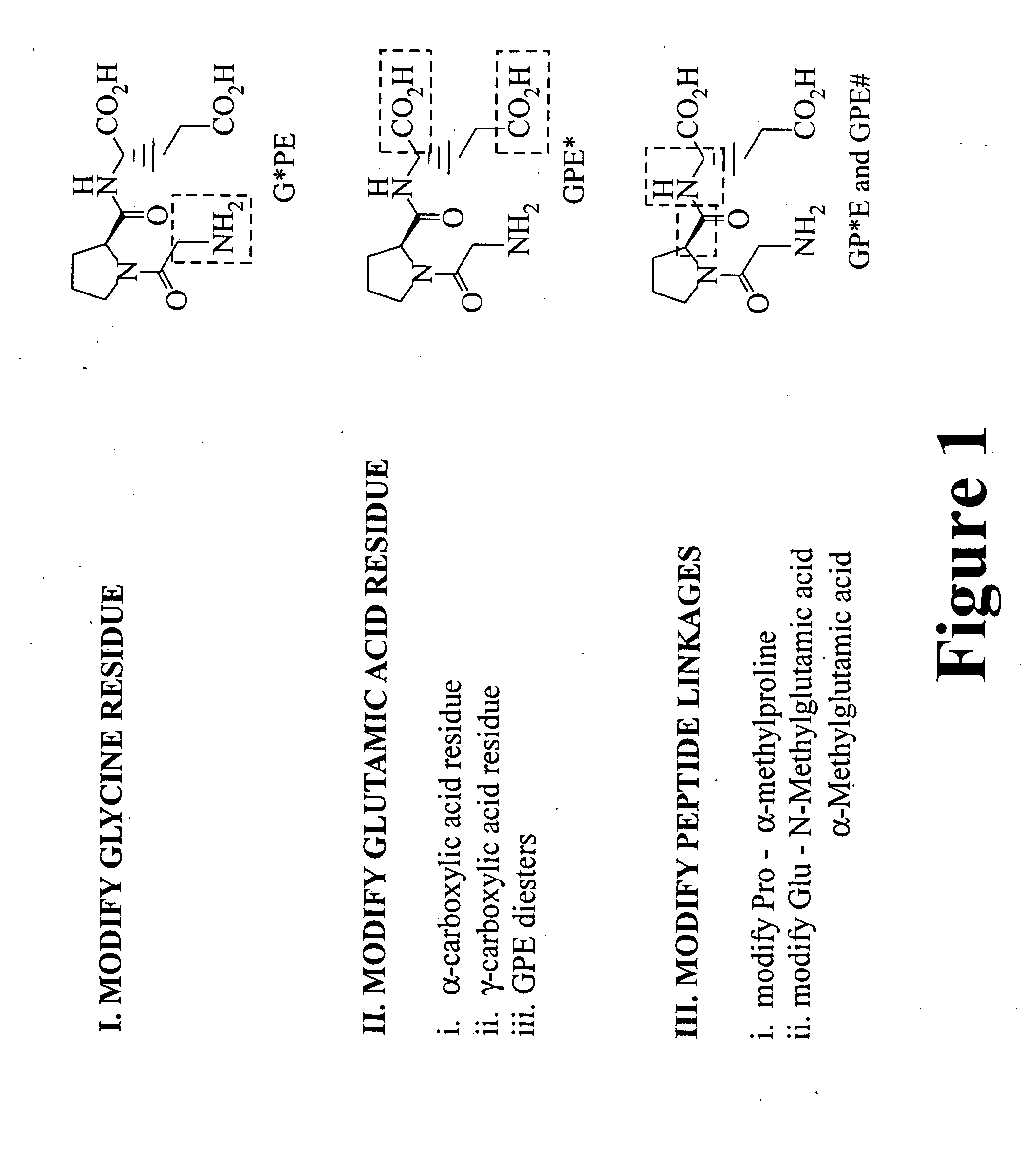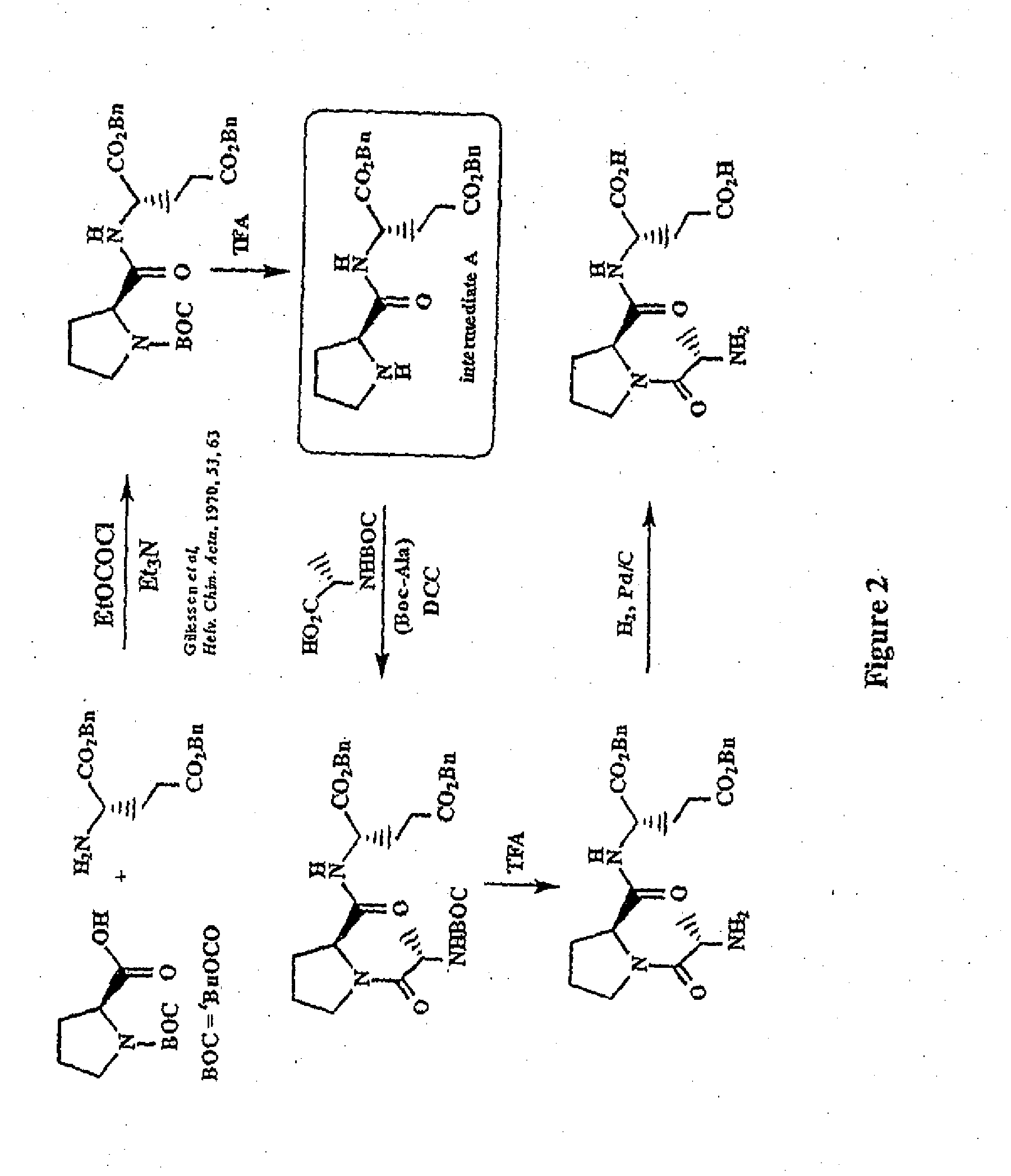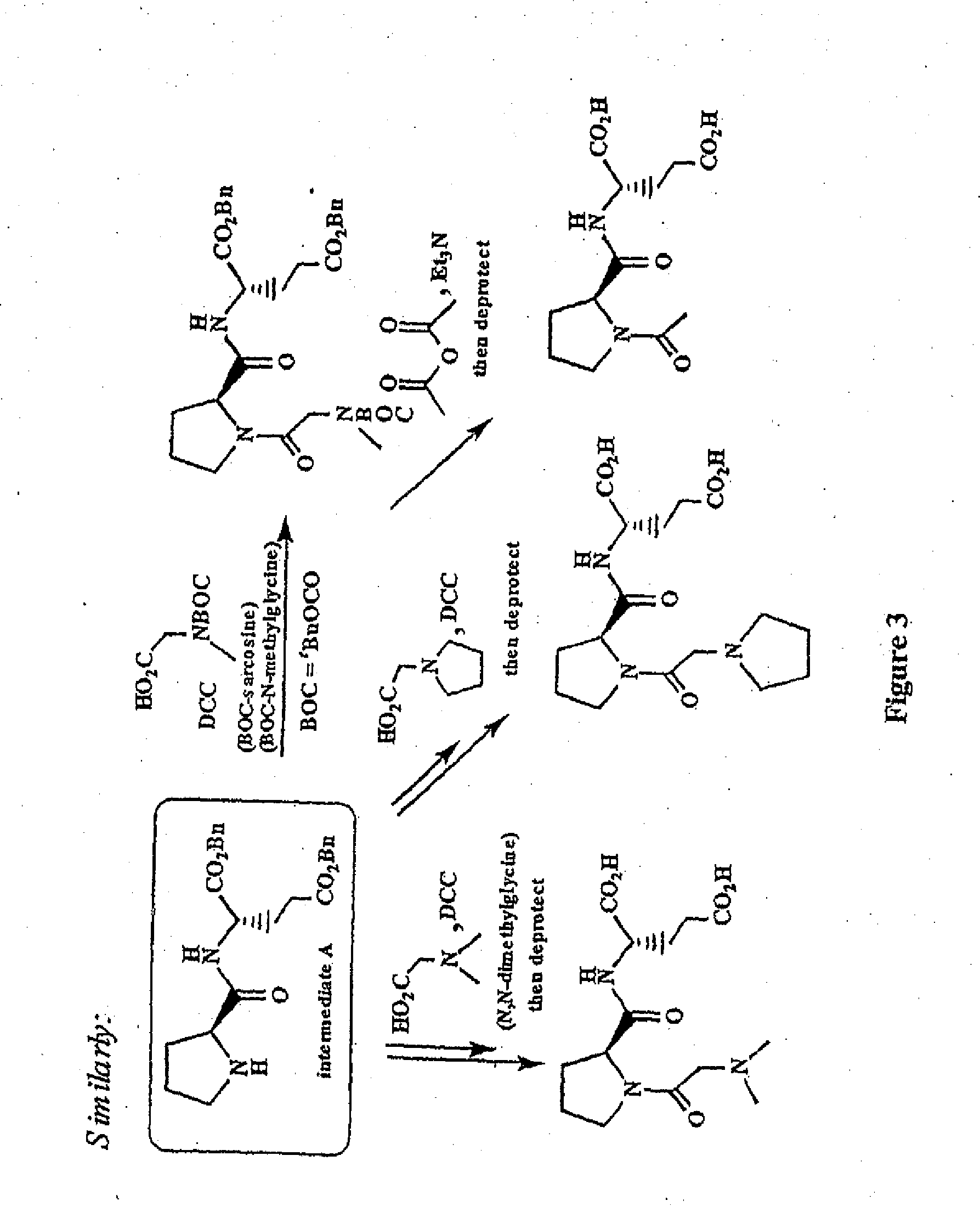Treatment of Autism Spectrum Disorders Using Glycyl-L-2-Methylprolyl-L-Glutamic Acid
a technology of methylprolyl-l-glutamic acid and treatment of autism spectrum disorders, which is applied in the direction of peptides/protein ingredients, drug compositions, peptides, etc., can solve the problems of no current treatment, no effective treatment, and limited patient care to management of symptoms
- Summary
- Abstract
- Description
- Claims
- Application Information
AI Technical Summary
Problems solved by technology
Method used
Image
Examples
example 1
Synthesis of N,N-Dimethylglycyl-L-prolyl)-L-glutamic acid
[0147]The following non-limiting example illustrates the synthesis of a compound of the invention, N,N-Dimethylglycyl-L-prolyl-L-glutamic acid
All starting materials and other reagents were purchased from Aldrich; BOC=tert-butoxycarbonyl; Bn=benzyl.
BOC-L-proline-(β-benzyl)-L-glutamic acid benzyl ester
[0148]To a solution of BOC-proline [Anderson G W and McGregor A C: J. Amer. Chem. Soc.: 79, 6810, 1994] (10 mmol) in dichloromethane (50 ml), cooled to 0° C., was added triethylamine (1.39 ml, 10 mmol) and ethyl chloroformate (0.96 ml, 10 mmol). The resultant mixture was stirred at 0° C. for 30 minutes. A solution of dibenzyl-L-glutamate (10 mmol) was then added and the mixture stirred at 0° C. for 2 hours then warmed to room temperature and stirred overnight. The reaction mixture was washed with aqueous sodium bicarbonate and citric acid (2 mol l−1) then dried (MgSO4) and concentrated at reduced pressure to give BOC-L-proline-L-gl...
example 2
Synthesis of Glycyl-L-2-Methyl-L-Prolyl-L-Glutamate Glycl-L-2-Methylprolyl-L-Glutamic Acid (G-2MePE)
[0152]
[0153]L-2-Methylproline and L-glutamic acid dibenzyl ester p-toluenesulphonate were purchased from Bachem, N-benzyloxycarbonyl-glycine from Acros Organics and bis(2-oxo-3-oxazolidinyl)phosphinic chloride (BoPCl, 97%) from Aldrich Chem. Co.
Methyl L-2-methylprolinate hydrochloride 2
[0154]Thionyl chloride (5.84 cm3, 80.1 mmol) was cautiously added dropwise to a stirred solution of (L)-2-methylproline 1 (0.43 g, 3.33 mmol) in anhydrous methanol (30 cm3) at −5° C. under an atmosphere of nitrogen. The reaction mixture was heated under reflux for 24 h, and the resultant pale yellow-coloured solution was concentrated to dryness in vacuo. The residue was dissolved in a 1:1 mixture of methanol and toluene (30 cm3) then concentrated to dryness to remove residual thionyl chloride. This procedure was repeated twice more, yielding hydrochloride 2 (0.62 g, 104%) as an hygroscopic, spectroscopi...
example 3
In Vitro Neuroprotection
[0159]Therapeutic effects of GPE analogs were examined in a series of experiments in vitro to determine their effects on neurodegeneration of neural cells of different origin. The in vitro systems described herein are well-established in the art and are known to be predictive of neuroprotective effects observed in vivo, including effects in humans suffering from neurodegenerative disorders.
Material and Methods
[0160]The following experimental protocol followed guidelines approved by the University of Auckland Animal Ethics Committee.
[0161]Preparation of Cortical Astrocyte Cultures for Harvest of Metabolised Cell Culture Supernatant
[0162]One cortical hemisphere from a postnatal day 1 rat was used and collected into 4 ml of DMEM. Trituration was performed using a 5 ml glass pipette and an 18-gauge needle. The cell suspension was sieved through a 100 μm cell strainer and washed in 50 ml DMEM (centrifugation for 5 min at 250 g). The sediment was resuspended in 20 ...
PUM
| Property | Measurement | Unit |
|---|---|---|
| mass | aaaaa | aaaaa |
| mass | aaaaa | aaaaa |
| temperature | aaaaa | aaaaa |
Abstract
Description
Claims
Application Information
 Login to View More
Login to View More - R&D
- Intellectual Property
- Life Sciences
- Materials
- Tech Scout
- Unparalleled Data Quality
- Higher Quality Content
- 60% Fewer Hallucinations
Browse by: Latest US Patents, China's latest patents, Technical Efficacy Thesaurus, Application Domain, Technology Topic, Popular Technical Reports.
© 2025 PatSnap. All rights reserved.Legal|Privacy policy|Modern Slavery Act Transparency Statement|Sitemap|About US| Contact US: help@patsnap.com



